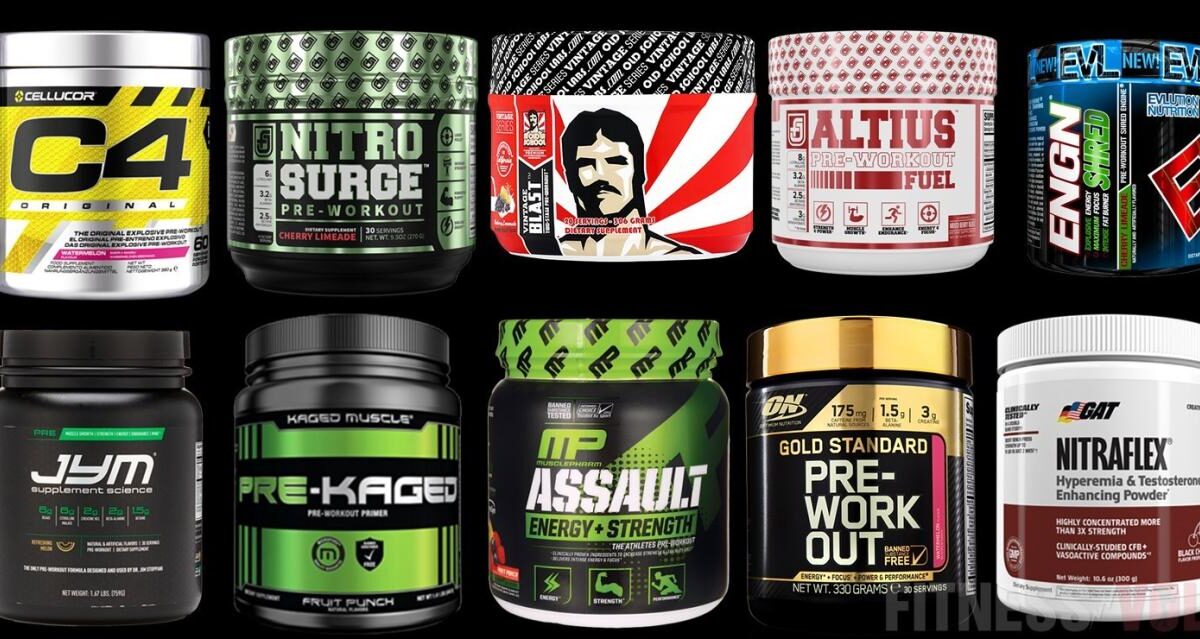
Fueling Your Fitness: A Comprehensive Guide To The Best Pre-Workout Supplements
Fueling Your Fitness: A Comprehensive Guide to the Best Pre-Workout Supplements
Related Articles
- The Ultimate Guide To Choosing The Best Protein Powder For Muscle Gain
- Unlocking Your Inner Athlete: Tips To Improve Your Workout Stamina
- How To Stay Motivated In Your Fitness Journey: A Comprehensive Guide To Unlocking Your Potential
- Finding The Right Workout Shoes: A Comprehensive Guide To Comfort, Performance, And Injury Prevention
- Restarting Your Journey: Unleashing Motivation For A New Beginning
Introduction
Dive into the best practices for your fitness journey, focusing on Fueling Your Fitness: A Comprehensive Guide to the Best Pre-Workout Supplements
Fueling Your Fitness: A Comprehensive Guide to the Best Pre-Workout Supplements

Pre-workout supplements have become increasingly popular among fitness enthusiasts, athletes, and even casual gym-goers. These supplements promise to enhance performance, boost energy levels, and improve overall workout intensity. However, with a vast array of products on the market, choosing the right pre-workout can be overwhelming. This comprehensive guide will delve into the world of pre-workout supplements, exploring their ingredients, benefits, potential drawbacks, and how to choose the best one for your individual needs.
1. Understanding the Science Behind Pre-Workout Supplements
Pre-workout supplements are formulated to provide a targeted boost before physical activity. Their effectiveness stems from a carefully selected blend of ingredients, each designed to address specific aspects of athletic performance. Key ingredients often include:
Caffeine: A well-known stimulant, caffeine enhances alertness, reduces perceived exertion, and improves both endurance and power output. It achieves this by increasing adrenaline and dopamine levels, leading to a heightened sense of energy and focus. However, excessive caffeine intake can lead to anxiety, insomnia, and digestive issues.
Creatine: A naturally occurring compound found in muscle tissue, creatine helps increase phosphocreatine stores, which are crucial for producing adenosine triphosphate (ATP), the body’s primary energy currency. This leads to improved strength, power, and high-intensity exercise capacity. While generally safe, some individuals may experience water retention and gastrointestinal discomfort.
Beta-Alanine: A non-essential amino acid, beta-alanine acts as a precursor to carnosine, a buffer that helps neutralize lactic acid buildup in muscles. By reducing muscle fatigue, beta-alanine can enhance endurance and high-intensity interval training (HIIT) performance. A common side effect is a temporary tingling sensation (paresthesia).
Citrulline Malate: This compound aids in nitric oxide production, leading to vasodilation (widening of blood vessels). Improved blood flow enhances nutrient delivery to muscles, reducing fatigue and improving performance. Citrulline malate is generally well-tolerated, with minimal side effects.
BCAAs (Branched-Chain Amino Acids): These essential amino acids (leucine, isoleucine, and valine) are crucial for muscle protein synthesis and recovery. While not directly boosting energy, BCAAs can help reduce muscle breakdown during intense workouts and promote muscle growth.
Nitric Oxide Boosters: Beyond citrulline malate, other ingredients like arginine and L-ornithine are included in some pre-workouts to enhance nitric oxide production. However, the effectiveness of these can vary significantly.

The optimal combination and dosage of these ingredients vary depending on the individual’s needs, training goals, and tolerance levels. It’s crucial to carefully review the ingredient list and recommended dosage before consuming any pre-workout supplement.
2. Different Types of Pre-Workout Supplements
Pre-workout supplements are not a one-size-fits-all solution. They are categorized based on their primary focus:
Stimulant-Based Pre-Workouts: These are the most common type, relying heavily on caffeine and other stimulants to enhance energy and focus. They are ideal for individuals seeking a significant boost in energy and mental alertness before intense workouts.
Stimulant-Free Pre-Workouts: These are designed for individuals sensitive to stimulants or those who prefer a less jittery experience. They often focus on ingredients like citrulline malate, beta-alanine, and BCAAs to improve performance and endurance.
Pre-Workout with Creatine: These supplements combine creatine with other performance-enhancing ingredients to maximize strength and power gains. They are particularly beneficial for weightlifters and power athletes.
Pre-Workout for Endurance: These formulations often prioritize ingredients that enhance oxygen utilization and reduce muscle fatigue, such as beta-alanine and citrulline malate. They are suitable for runners, cyclists, and other endurance athletes.
Pre-Workout for Focus: Some pre-workouts emphasize ingredients known to improve cognitive function and focus, such as caffeine and L-theanine. These are helpful for individuals who need a mental edge during their workouts.
3. Benefits of Using Pre-Workout Supplements
When used appropriately, pre-workout supplements can offer several benefits:
Increased Energy and Focus: Stimulants like caffeine significantly enhance energy levels and mental alertness, allowing for more intense and productive workouts.
Improved Strength and Power: Creatine supplementation leads to increased muscle strength and power output, crucial for weight training and high-intensity activities.
Enhanced Endurance: Ingredients like beta-alanine and citrulline malate help delay muscle fatigue, improving endurance during prolonged exercise.
Reduced Muscle Soreness: Some pre-workout supplements contain ingredients that may help reduce muscle soreness and promote faster recovery.
Improved Muscle Growth: BCAAs and creatine contribute to muscle protein synthesis, potentially aiding muscle growth and recovery.
4. Potential Drawbacks and Side Effects
While pre-workout supplements can be beneficial, they also carry potential drawbacks:
Stimulant-Related Side Effects: Excessive caffeine intake can lead to anxiety, jitters, insomnia, heart palpitations, and digestive upset.
Gastrointestinal Issues: Some ingredients, such as creatine and beta-alanine, can cause stomach cramps, diarrhea, or nausea in some individuals.
Interactions with Medications: Pre-workout supplements can interact with certain medications, so it’s crucial to consult a doctor before use, especially if you have pre-existing health conditions.
Dependence: Regular use of stimulant-based pre-workouts can lead to dependence, requiring progressively higher doses to achieve the same effect.
Artificial Sweeteners and Additives: Many pre-workout supplements contain artificial sweeteners and other additives that some individuals may be sensitive to.
5. Choosing the Right Pre-Workout Supplement: A Step-by-Step Guide
Selecting the right pre-workout requires careful consideration of several factors:
Identify Your Goals: Determine your primary fitness goals. Are you aiming to increase strength, endurance, or overall energy levels? This will help narrow down the type of pre-workout most suitable for you.
Assess Your Tolerance to Stimulants: Consider your sensitivity to caffeine and other stimulants. If you’re sensitive, opt for a stimulant-free or low-stimulant formula.
Read Ingredient Labels Carefully: Pay close attention to the ingredient list, dosage, and serving size. Choose products with transparent labeling and recognizable ingredients.
Check for Third-Party Testing: Look for pre-workout supplements that have been tested by a reputable third-party laboratory to ensure purity and quality.
Start with a Low Dose: Begin with a lower dose than recommended to assess your tolerance and avoid potential side effects. Gradually increase the dosage as needed.
Listen to Your Body: Pay attention to how your body responds to the pre-workout supplement. If you experience any adverse effects, discontinue use and consult a healthcare professional.
Consider Your Budget: Pre-workout supplements vary significantly in price. Choose a product that fits your budget without compromising quality.
6. Tips and Tricks for Maximizing Pre-Workout Effectiveness
To maximize the benefits of pre-workout supplements, consider these tips:
Timing is Key: Consume your pre-workout supplement 20-30 minutes before your workout to allow sufficient time for absorption.
Hydration is Crucial: Drink plenty of water throughout the day, especially before, during, and after your workout.
Proper Diet and Sleep: Ensure you are following a balanced diet and getting adequate sleep, as these factors significantly impact workout performance.
Listen to Your Body: Don’t push yourself too hard, especially when starting a new pre-workout supplement. Adjust your dosage and intensity based on your body’s response.
Cycle Your Pre-Workout: Consider cycling your pre-workout usage to avoid potential tolerance or dependence. Take breaks periodically to allow your body to adapt.
Combine with Other Supplements: Consider combining your pre-workout with other supplements like protein powder or creatine monohydrate to enhance recovery and muscle growth.
Consult a Professional: If you have any underlying health conditions or are taking medication, consult a doctor or registered dietitian before using pre-workout supplements.
7. Progression of Pre-Workout Supplements and Future Trends
The pre-workout supplement market has evolved significantly over the years. Early formulations were primarily focused on caffeine and simple carbohydrates. However, advancements in sports nutrition have led to more sophisticated blends incorporating a wider range of ingredients targeting specific performance aspects. Future trends suggest a continued focus on:
Personalized Nutrition: The development of pre-workout supplements tailored to individual genetic profiles and training goals.
Natural Ingredients: A growing emphasis on natural and organic ingredients, reducing reliance on artificial sweeteners and additives.
Improved Delivery Systems: The use of advanced delivery systems to enhance absorption and bioavailability of key ingredients.
Focus on Recovery: The incorporation of ingredients that support muscle recovery and reduce inflammation.
Transparency and Safety: Increased emphasis on third-party testing and transparent labeling to ensure product purity and safety.
Conclusion
Pre-workout supplements can be a valuable tool for enhancing athletic performance, but they are not a magic bullet. Their effectiveness depends on several factors, including the individual’s training program, diet, sleep, and overall health. By understanding the ingredients, benefits, and potential drawbacks of pre-workout supplements, and by following the guidelines outlined in this article, you can make an informed decision and safely maximize your workout results. Remember to always prioritize a balanced diet, proper training, and adequate rest for optimal fitness outcomes.
Frequently Asked Questions (FAQs)
Are pre-workout supplements safe? Generally, pre-workout supplements are safe when used as directed and by individuals without pre-existing health conditions. However, potential side effects exist, and it’s crucial to consult a healthcare professional before use.
Can I use pre-workout supplements if I’m pregnant or breastfeeding? No, it’s generally recommended to avoid pre-workout supplements during pregnancy and breastfeeding due to potential risks to the mother and child.
How long does it take to see results from pre-workout supplements? The time it takes to see results varies depending on the individual, the type of supplement, and the dosage. Some individuals may notice effects immediately, while others may require several weeks of consistent use.
Can I take pre-workout supplements every day? It’s not recommended to take pre-workout supplements every day, especially those with high stimulant content. Cycling your use can help prevent tolerance and reduce the risk of side effects.
What should I do if I experience side effects? If you experience any adverse side effects, discontinue use immediately and consult a healthcare professional.
Can I mix different pre-workout supplements? It’s generally not recommended to mix different pre-workout supplements without consulting a healthcare professional, as this could lead to unexpected interactions and adverse effects.
Source URL: [Insert a relevant URL here, for example, a reputable sports nutrition website or research article on pre-workout supplements] (e.g., https://www.ncbi.nlm.nih.gov/ – This is a placeholder; replace with an actual, relevant URL)
Closure
Thank you for joining us; keep visiting for updates on Fueling Your Fitness: A Comprehensive Guide to the Best Pre-Workout Supplements and related topics.
Stay tuned for more expert tips to elevate your fitness journey!
Keep up with our latest fitness and wellness content!



